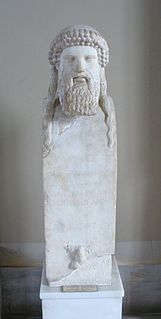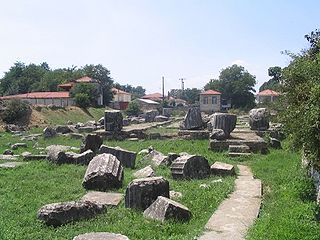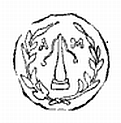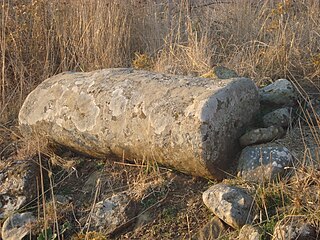
Alcamenes was an ancient Greek sculptor of Lemnos and Athens, who flourished in the 2nd half of the 5th century BC. He was a younger contemporary of Phidias and noted for the delicacy and finish of his works, among which a Hephaestus and an Aphrodite "of the Gardens" were conspicuous.

Ares is the Greek god of war. He is one of the Twelve Olympians, the son of Zeus and Hera. In Greek literature, he often represents the physical or violent and untamed aspect of war, in contrast to his sister, the armored Athena, whose functions as a goddess of intelligence include military strategy and generalship.

Enyo was a goddess of war in Classical Greek mythology. She frequently is associated with the war god Ares, as a companion, sister, wife, or perhaps, mother.
Enyalius or Enyalios in Greek mythology is generally a son of Ares by Enyo and also a byname of Ares the god of war. Though Enyalius being a by-name of Ares is the most accepted version, in Mycenaean times Ares and Enyalius were differentiated as separate deities. Enyalius is often seen as the God of soldiers and warriors from Ares cult. On the Mycenaean Greek Linear B KN V 52 tablet, the name 𐀁𐀝𐀷𐀪𐀍, e-nu-wa-ri-jo, has been interpreted to refer to this same Enyalios.
In Greek mythology, Porthaon, sometimes referred to as Parthaon or Portheus, was the king of Calydon and son of Agenor or Ares by Epicaste and thus brother of Demonice and possibly Thestius. He was the husband of Euryte, daughter of Hippodamas, who became the mother of his children, Oeneus, Agrius, Alcathous, Melas, Leucopeus and Sterope. In some account, his wife Laothoe bore him three daughters, Sterope, Eurythemiste and Stratonice, wife of King Melaneus of Oechalia. By an unnamed servant, Porthaon was the father of the Argonaut Laocoön. Dia, the consort of his son Agrius was also called his daughter.

Tegea was a settlement in ancient Arcadia, and it is also a former municipality in Arcadia, Peloponnese, Greece. Since the 2011 local government reform it is part of the municipality Tripoli, of which it is a municipal unit. The municipal unit has an area of 118.350 km2. Its seat was the village Stadio.
In Greek mythology, Caanthus or Kaanthos was the son of Oceanus and Tethys, and the brother of Melia, who was the consort of Apollo, and an important cult figure at Thebes. According to the second-century geographer Pausanias, Caanthus was commanded by his father Oceanus to seek his sister Melia, who had been abducted by Apollo. But being unable to get Melia away from Apollo, Caanthus set fire to the Apollo's sanctuary, and Apollo shot and killed him.
Agapenor was a leader of the Arcadians in the Trojan war. He was a son of Ancaeus, and grandson of Lycurgus. As king of the Arcadians he received sixty ships from Agamemnon, in which he led his Arcadians to Troy. He also occurs among the suitors of Helen. He was one of the men to be in the Trojan Horse.
In Greek mythology, Thyia was a female figure associated with cults of several major gods.

Apollo Agyieus was an epithet of the Greek god Apollo describing him as the protector of the streets, public places, and the entrances to homes. As such he was worshiped at Acharnae, Mycenae, and at Tegea. The origin of the worship of Apollo Agyieus in the last of these places is related by Pausanias.
Alea was an epithet of the Greek goddess Athena, prominent in Arcadian mythology, under which she was worshiped at Alea, Mantineia and Tegea. Alea was initially an independent goddess, but was eventually assimilated with Athena. A statue of Athena Alea existed on the road from Sparta to Therapne. Her most important sanctuary was the famous Temple of Athena Alea at Tegea.
Caryae or Karyai was a town of ancient Laconia upon the frontiers of Arcadia. It was originally an Arcadian town belonging to Tegea, but was conquered by the Spartans and annexed to their territory. Caryae revolted from Sparta after the Battle of Leuctra (371 BCE), and offered to guide a Theban army into Laconia; but shortly afterwards it was severely punished for its treachery, for Archidamus III took the town and put to death all the inhabitants who were made prisoners.
Triteia was, in Greek mythology, the daughter of the sea-god Triton and mother, by Ares, of Melanippus who gave to a town in Achaea the name of his mother. Sacrifices were offered there to Ares and Tritaea in the temple of Athena.
Geronthrae or Geronthrai, or Geranthrae or Geranthrai (Γεράνθραι), also written as Gerenthrae or Gerenthrai (Γερένθραι), was a town of ancient Laconia, situated in a commanding position upon the southwestern face of the mountain above the plain of the Eurotas. We learn from the Pausanias that Geronthrae possessed a temple and grove of Ares, to whom a yearly festival was celebrated, from which women were excluded. Around the agora there were fountains of potable water. On the acropolis stood a temple of Apollo.
Aphneius was in Greek mythology an epithet of the god Ares, under which he had a temple on Mount Cnesius, near Tegea in Arcadia. The name signified him as the giver of food or plenty.

Areia or Aphrodite Areia or "Aphrodite the Warlike" was a cultic epithet of the Greek goddess Aphrodite, in which she was depicted in full armor like the god Ares. This representation of the goddess was the norm at Sparta. There were other, similarly martial interpretations of the goddess, such as at her Sanctuary at Cythera, where she was worshiped under the epithet Aphrodite Urania, who was also represented as being armed.

Tritaea or Tritaia was a polis (city-state) of Achaea, and the most inland of the 12 Achaean cities, was distant 120 stadia from Pharae. According Pausanias, Tritaea's foundation was said to be due to either: Celbidas, who came from Cumae; or Melanippus, a son of Ares and Triteia, herself a daughter of Triton and priestess of Athena, and that Melanippus named the town after his mother.

The Temple of Athena Alea was a sanctuary at Tegea in Ancient Greece, dedicated to Athena under the epithet Athena Alea. It was a significant temple, regarded to be one of the most important shrines of Athena in Ancient Greece.
Cenchreae or Kenchreai, also Cenchreiae or Kenchreiai (Κεγχρειαί), was a town in ancient Argolis, south of Argos, and on the road from the latter city to Tegea. Pausanias says that it was to the right of the Trochus (τρόχος), which must not be regarded as a place, but as the name of the carriage road leading to Lerna. Near Cenchreae Pausanias saw the sepulchral monuments of the Argives, who conquered the Lacedaemonians at Hysiae.
Pallantium or Pallantion, more rarely Palantium or Palantion (Παλάντιον), was one of the most ancient towns of Arcadia, in the district Maenalia, said to have been founded by Pallas, a son of Lycaon. It was situated west of Tegea, in a small plain called the Pallantic plain which was separated from the territory of Tegea by a choma (χῶμα) or dyke. It was from this town that Evander of Pallene was said to have led colonists to the banks of the Tiber, and from it the Palatium or Palatine Mount at Rome was reputed to have derived its name.










